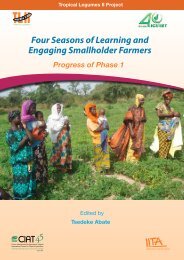Four Seasons of Learning and Engaging Smallholder Farmers - icrisat
Four Seasons of Learning and Engaging Smallholder Farmers - icrisat
Four Seasons of Learning and Engaging Smallholder Farmers - icrisat
You also want an ePaper? Increase the reach of your titles
YUMPU automatically turns print PDFs into web optimized ePapers that Google loves.
The approach<br />
With TL II project, the identified constraint has necessitated the strengthening <strong>of</strong> collaboration between<br />
the public <strong>and</strong> private sector. The seed systems objective (Objective 8) was instrumental in catalyzing<br />
up-scaling Foundation <strong>and</strong> Certified Seed, seed delivery testing models, <strong>and</strong> raising the level <strong>of</strong> farmers’<br />
awareness. The project has initiated linkages between public <strong>and</strong> private partnership to facilitate<br />
efficient seed production <strong>and</strong> efficient marketing <strong>of</strong> legumes for efficient seed diffusion. For example, the<br />
involvement <strong>of</strong> Andhra Pradesh State Seed Development Cooperation (APSSDC) <strong>and</strong> Andhra Pradesh<br />
State Seed Certifying Agency (APSSCA) in roguing, inspection <strong>and</strong> selection, <strong>and</strong> certification <strong>of</strong> farmer’s<br />
seed production fields has ensured the purity <strong>and</strong> quality <strong>of</strong> chickpea, groundnut <strong>and</strong> pigeonpea seeds.<br />
In Maharashtra, the involvement <strong>of</strong> the Maharashtra State Seed Corporation, Ltd (MSSCL) <strong>and</strong> Krishi<br />
Vigyan Kendras (KVKs) has linked farmer groups <strong>of</strong> selected villages involved in seed production for<br />
efficient marketing <strong>and</strong> diffusion <strong>of</strong> certified seed in the project sites. The MSSCL function is to monitor<br />
seed production plots, which will lead to the assurance <strong>of</strong> the procurement <strong>of</strong> seed produced by the<br />
farmers. This has necessitated the selling <strong>of</strong> farmer’s seed as Truthful Labeled seed to farmers.<br />
Groups <strong>of</strong> farmers in the project sites were formed as a result <strong>of</strong> the TL II project. This enabled the<br />
marketing <strong>of</strong> own seed to co-farmers. In the project sites, government also provided seed subsidies<br />
under various schemes <strong>and</strong> packages. Diverse marketing schemes were also observed in the project<br />
area. Even though private traders <strong>and</strong> Department <strong>of</strong> Agriculture are the two key players in seed delivery<br />
<strong>of</strong> legumes in India, majority <strong>of</strong> the farmers still saved their own seed <strong>and</strong> the excess seed kernels were<br />
sold in the village during market days <strong>and</strong> co-farmers purchased them with a very minimal transaction<br />
cost involved. For traders, seed is outsourced from the local area with good quality, much cheaper, <strong>and</strong><br />
is well perceived by local farmers since the varieties are adapted to the locality <strong>and</strong> are high yielding<br />
<strong>and</strong> sold within the area without incurring transport charges as compared to the seed procured outside<br />
the districts or state (more <strong>of</strong>ten, the seed is not authenticated, much expensive, no guarantee <strong>of</strong> the<br />
performance since this is new in the area, <strong>and</strong> in many instances the yield is low). The traders fixed<br />
Rs.3 to 4 ($0.08) as pr<strong>of</strong>it margin for a kg <strong>of</strong> seed. In other districts, where seed is accessible <strong>and</strong> moves<br />
freely, some farmers no longer keep their own seed, hence, they are dependent on the traders.<br />
Infrastructure <strong>and</strong> equipment<br />
Seed production facilities were upgraded at partner NARS research stations in Andhra Pradesh <strong>and</strong><br />
Maharashtra. Installation <strong>of</strong> submersible pump, laying <strong>of</strong> PVC pipelines (2800 ft) <strong>and</strong> fencing <strong>of</strong> field<br />
were upgraded in PDKV, Akola research station to strengthen <strong>and</strong> improve irrigation facilities <strong>and</strong> protect<br />
the crop from animals for better seed production. In Andhra Pradesh, facilities for seed production were<br />
upgraded at the ANGRAU Research Station in T<strong>and</strong>ur (Table 9-7).<br />
Table 9-7: List <strong>of</strong> equipment purchased by AP<br />
No. Item Qty. Purpose Cost (Rs.)<br />
1 HDPE Nylon net 205 kg For isolation in Nucleus seed plots 67,035.00<br />
2 Meteorological equipment 1 For recording daily weather parameters. 41,490.00<br />
3 Winnower 1 For winnowing <strong>of</strong> harvested produce. 49,044.00<br />
4 Water tanker 1 For providing lifesaving irrigation to<br />
227,552.00<br />
Germplasm <strong>and</strong> breeding material.<br />
5 Cooling incubator cum shaker 1 For maintenance <strong>of</strong> Fusarium udum cultures. 350,000.00<br />
6 Horizontal <strong>and</strong> vertical<br />
1 For molecular variability work <strong>of</strong> the wilt 125,000.00<br />
electrophoresis systems.<br />
pathogen.<br />
Total 860,121.00<br />
Seed storage facility (go down) with capacity <strong>of</strong> 300 MT is constructed at ARS, T<strong>and</strong>ur, Andhra Pradesh.<br />
However, in Maharashtra, farmers were not keen on having a seed storage facility due to non-availability<br />
<strong>of</strong> l<strong>and</strong> to construct the facility.<br />
Progress <strong>of</strong> Phase 1<br />
199

















